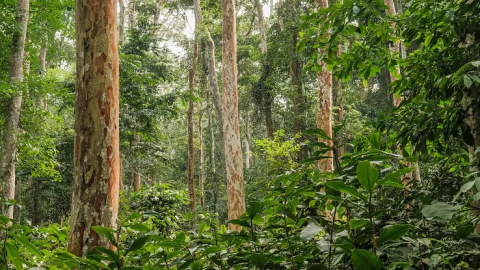Initiative Steps Up Biodiversity Conservation In West Africa Forests
African News, Latest Headlines, News Around Africa Wednesday, June 8th, 2022
(AFRICAN EXAMINER) – Critical Ecosystem Partnership Fund (CEPF) in collaboration with BirdLife and other partners is currently improving the protection and preservation of animal and plant species, habitats, ecosystems found in the Guinean Forests of West Africa (GFWA) Biodiversity Hotspot that stretches across most of West Africa.
The CEPF is a joint initiative of the Agence Française de Développement, Conservation International, the European Union, the Global Environment Facility, the Government of Japan, and the World Bank. A fundamental goal is to ensure civil society is engaged in biodiversity conservation.
BirdLife is the world’s largest conservation partnership with over 10 million members and supporters. The partnership strives to conserve birds, their habitats, and global biodiversity, working with people towards sustainability in the use of natural resources.
According to the CEPF baseline report for the hotspot, the GFWA is a significant hotspot serving as “home to 9,000 plants including 1,800 endemic species, 416 mammals (65 endemic), 917 birds (48 endemic), 107 reptiles (20 endemic), 269 amphibians (118 endemics) and 1,000 butterflies (1 endemic)”, along with five
Critically Endangered Mammal species and 21 Endangered primate species. These indisputably make the area a priority for biodiversity conservation.
CEPF donors selected the GFWA Biodiversity Hotspot in 2012 for a new investment because biodiversity was seriously threatened and opportunities existed to enhance civil society capacities and create synergies, despite a weak governance and a lack of a clear vision.
Since 2016, CEPF investment focused on providing resources and capacity to civil society organizations at the grassroot, regional, national, and international levels with the aim to demonstrate models reconciling biodiversity conservation and socio-economic development in the hotspot.
In a statement by the Head of BirdLife’s West Africa Sub Regional Office, Jean-Baptiste Deffontaines said in the GFWA Biodiversity Hotspot, CEPF has entrusted BirdLife International to be the dedicated regional implementation team (RIT) to provide strategic leadership for the CEPF investment in the hotspot.
“BirdLife has been CEPF’s project implementing partner, over the last six years, working with the civil society to protect the Guinean Forests of West Africa biodiversity hotspot. This has led to unprecedented results – but there is much more to be done! We remain committed to continuing this effort”, he said.
He also noted that the ongoing 4-day Final Assessment Workshop in Accra, Ghana, aims to deal with the impact of its $10 million investment across this biodiversity hotspot covering parts of Guinea, Sierra Leone, Liberia, Côte d’Ivoire, Ghana, Togo, Benin, Nigeria, Cameroon, São Tomé and Príncipe and Equatorial Guinea.
According to him, by bringing together CEPF-funded projects implementers, as well as technical & financial partners, the parties will deliberate on the results and impacts of projects, the sustainability of efforts for the long-term, and lessons learned from various projects across the countries that fall within the hotspot.
“It is our hope that through this engagement the CEPF and other stakeholders can all help to intensify the conservation discussion and build an active network of conservationists, from CSOs to journalists, to drive biodiversity conservation.
“After 78 grants for a total of $10.1 million, ten partnerships among civil society, government, private sector, and communities were formed or strengthened so far to promote best practices in mining, sustainable forestry and agriculture”, he added.
Grant Director for the GFWA Hotspot and the Cerrado Hotspot, Peggy Poncelet said the 62 supported organizations have successfully demonstrated that hundred thousands of hectares within production landscapes could be managed for biodiversity conservation or sustainably used.
She further explained that they did this by empowering more than one hundred communities to advocate for and manage these areas, following land-use plans elaborated to facilitate good governance and collaboration”, the statement added.
“In turns, it benefited more than 200 communities, with livelihood, and job creation activities or benefit-sharing mechanisms. Future investments will be able to build on this strong legacy, which also includes a drastic reduction in knowledge gaps on species and KBAs, especially on freshwater areas; a stronger civil society which saw 74 percent of the local and regional organizations gain institutional capacities; and a participatory long-term vision for the hotspot paving the way for the next 15 years”, she stressed.
Related Posts
Short URL: https://www.africanexaminer.com/?p=77718






















